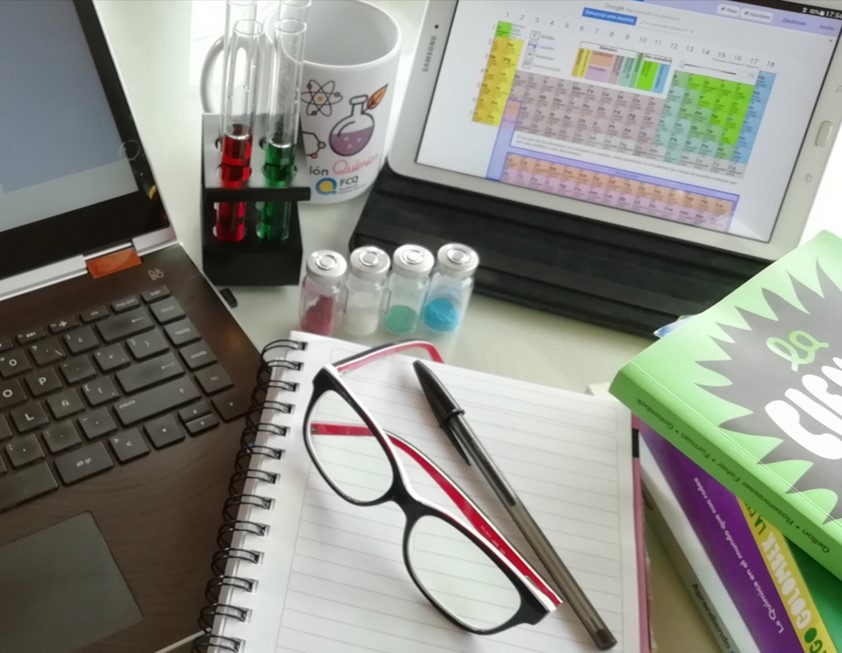The practical works in the classes of Chemistry of the teaching school
A didactic analysis
Keywords:
chemistry teaching, chemistry teacher training, practical work, didactic models, formative purposesAbstract
Initial teacher training for education in Natural Sciences involves the approach to the products and processes of science for its teaching, from a didactic approach (Seferian, 2015: 15-32; Furman et al. 2018: 17) that contemplates the selection of teaching strategies for the understanding of scientific knowledge from its own nature and the construction of disciplinary knowledge for teaching. Accordingly, we highlight the professional work of teachers in the design and development of meaningful didactic proposals, in line with the formative purposes for teacher training in Natural Sciences.
In this article, we present the findings of an exploratory research conducted in the Secondary Education Teacher Training in Chemistry in the province of Córdoba, during the months of August 2019 to July 2020. The purpose was focused on making approaches to the didactic models, the epistemological conceptions that guide the pedagogical decisions of the teachers and the image of science that is propitiated and constructed in the chemistry classes of the Profesorado. The methodological approach was qualitative, using categories and indicators (organized in an evaluation grid designed by the research team) for the analysis of the practical work implemented by teachers in their classes of curricular units of the Specific Training Field. The categories and indicators of the grid were constructed based on the Curricular Design of the teaching staff and on the proposal elaborated by Caamaño (2003) regarding the purposes, work methodology and formative purposes for experimental practical work.
References
Caamaño, A. (2003). Los trabajos prácticos en ciencias. Jiménez, A., Enseñar Ciencias. Barcelona: Graó.
Flores, J.; Caballero Sahelices, M. C.; Moreira, A. (2009). El laboratorio en la enseñanza de las ciencias: Una visión integral en este complejo ambiente de aprendizaje. Revista de Investigación, 68 (33), 75-112.
Furió Más, C. (2006). La motivación de los estudiantes y la enseñanza de la química. Una cuestión controvertida. Educación Química, 17, 222-227.
Furman, M. (2021). Enseñar distinto. Buenos Aires: Siglo XXI.
Furman, M.; Gellon, G.; Rosenvasser Feher, E.; Golombek, D. (2018). La ciencia en el aula. Lo que nos dice la ciencia sobre cómo enseñarla. Buenos Aires: Siglo XXI.
Gil Pérez, D.; Furió Más, C.; Valdés, P.; Salinas, J.; Martínez-Torregrosa, J.; Guisasola, J.; González, E.; Dumas-Carré, A.; Goffard, M.; Pessoa de Carvalho, A. (1999). ¿Tiene sentido seguir distinguiendo entre aprendizaje de conceptos, resolución de problemas de lápiz y papel y realización de prácticas de laboratorio? Enseñanza de las ciencias, 17 (2), 311-320.
Giménez, J.; López, J.; Amador Rodríguez, R.; Meinardi, E. (2015). Representaciones de las prácticas de laboratorio en profesores en ejercicio. Enseñanza de la Física, 27, 259-267.
Hodson, D. (1994). Hacia un enfoque más crítico del trabajo de laboratorio. Enseñanza de las Ciencias, 12 (3), 299-133.
Liguori, L.; Noste, M. I. (2014). Didáctica de las Ciencias Naturales. Enseñar Ciencias Naturales. Rosario: Homo Sapiens.
Mazzitelli, C. (2007). El aprendizaje de la Física como reelaboración conceptual a la luz de algunas teorías psicosociales. Tesis doctoral. Mendoza: Universidad Nacional de Cuyo.
Mazzitelli, C. y Guirado, A. (comps.). (2010). La enseñanza y el aprendizaje de las Ciencias. Estudios de las representaciones sociales de docentes y futuros docentes en Ciencias. San Juan: Editorial FFHA–UNSJ.
Mazzitelli, C. A. (2012). Representaciones acerca de la enseñanza y aprendizaje de las ciencias durante la formación docente inicial. Profesorado. Revista de Currículum y formación del profesorado, 16 (3), 392-406.
Ministerio de Educación de la provincia de Córdoba (2015). Diseño Curricular del Profesorado de Educación Secundaria en Química. Córdoba: Dirección General de Educación Superior.
Olivera, A. C.; Mazzitelli, C. A.; Guirado, A. M. (2015). El conocimiento construido por los alumnos en las clases de química. Enseñanza de las Ciencias, 14 (1), 77-94.
Sanmartí, N. (2001). Enseñar a enseñar ciencias en secundaria: un reto muy completo. Revista Interuniversitaria de Formación del Profesorado, 40, 31-48.
Seferian, A. (2015). Química y su enseñanza. ¿Qué hay de nuevo ahora? Buenos Aires: Dunken.
Shulman, L. (1986). Those who understand: Knowledge growth in teaching. Educational Researcher, 15 (2), 4-14.
Anexo I
Grilla de valoración

Downloads
Published
Issue
Section
License

This work is licensed under a Creative Commons Attribution-NonCommercial-ShareAlike 4.0 International License.
Atribución No Comercial Compartir Igual (by-nc-sa):
No se permitirá un uso comercial de la obra original, ni de las posibles obras derivadas, la distribución de las cuales se debe hacer con una licencia igual a la que regula la obra original.






